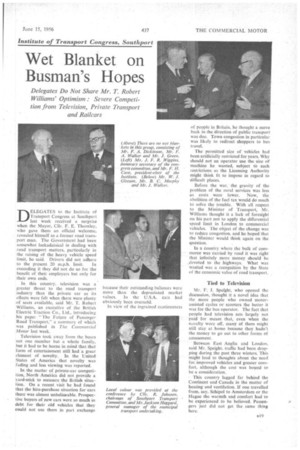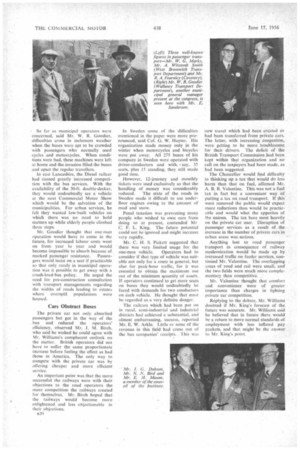Wet Blanket on Busman's Hopes
Page 53

Page 54

If you've noticed an error in this article please click here to report it so we can fix it.
Delegates Do Not Share Mr. T. Robert Williams' Optimism : Severe Competition from Television, Private Transport and Railcars
DELEGATES to the Inztitute of Transport Congress at Southport last week received a surprise when the Mayor, Cllr. F. E. Thornley, who gave them an official welcome, revealed himself as a former road transport man. The Government had been somewhat lackadaisical in dealing with road transport matters, particularly in the raising of the heavy vehicle speed limit, he said. Drivers did not adhere
to the present 20 m.p.h. limit. In exceeding it they did not do so for the benefit of their employers but only for their own ends. .
In this country. television was a greater threat to the road transport industry than the private car as its effects were felt when there were plenty .of seats available, said Mr. T. Robert Williams, an executive of the British Electric Traction Co., Ltd., introducing his impel "The Future of Passenger Road Transport," a summary of which was published in The Commercial Motor last week.
Television took away from the buses not one member but a whole family, hut it had to be borne in mind that that form of entertainment still had a great clement of novelty. In the United States of America that novelty was fading and less viewing was reported.
In the matter of private-car competition, North America did not provide a yard-stick to measure the British situation. On a recent visit he had found that the hire-purchase situation for cars there was almost unbelievable. Prospective buyers of new cars were so much in debt for their old vehicles that they could not use them in part exchange
because their outstanding balances were more than the depreciated market values. In the U.S.A. cars had obviously been oversold.
In view of the ingrained cautiousness of people in Britain, he thought a move back in the direction of public transport was due. Town congestion in particular was likely to redirect shoppers to bus travel.
The permitted size of vehicles had been artificially restricted for years. Why should not an operator use the size of machine he wanted, subject tb such restrictions as the Licensing Authority might think lit to impose in regard to difficult places.
Before the war, the gravity of the problem of the rural services was less as costs were lower. Now, the abolition of the fuel tax would do much to solve the trouble. With all respect to the Minister of Transport, Mr. Williams thought it a lack of foresight on his part not to apply the differential speed limit in London to commercial vehicles. The object of the change was to reduce congestion, and he hoped that the Minister would think again on the question.
In a Country where the bulk of commerce was carried by road it was right that infinitely more money should be _devoted to the highways. What was wanted was a recognition by the State of the economic value of road transport.
Tied to Television Mr. F. J. Spefght, who opened the discussion, thought it a novel idea that the more people who owned motorassisted cycles or scooters the better it was for the bus operator. The fact that people had television sets largely not paid for meant that, even when the novelty wore off, many of them might still stay at home because they hadn't the money to go out to other forms of amusement.
Between East Anglia and London. said Mr. Speight. traffic had been dropping during the past three winters. This might lead to thoughts about the need for. improved vehicles and greater comfort, although the cost was bound to be a consideration.
• This country lagged far behind the Continent and Canada in the matter of heating and ventilation. If one travelled from, say, Schipol to Amsterdam or the Hague the warmth and comfort had to be experienced to be believed. Passengers just did not get the same thing here. So far as municipal operators were concerned, said Mr. W. R. Goodier, difficulties arose in inclement weather when the buses were apt to be crowded with passengers who normally used cycles and motorcycles. When conditions were bad, these machines were left at home and the invasion filled the buses and upset the regular travellers.
In east Lancashire. the Diesel railcar had caused greatly increased competition with the bus services. With the availability of the 30-ft. double-decker, they would undoubtedly see a vehicle at the next Commercial Motor Show which would be the salvation of the municipalities. For urban services, he felt they wanted low-built vehicles on which there was no need to bold matters up while elderly people climbed three steps.
Mr. Goodier thought that one-man operation would have to come in the future, for increased labour costs went on from year to year and would become impossible to absorb because of marked passenger resistance. Passengers would insist on a seat if practicable so that only rarely in municipal operation was it possible to get away with a
crush-load-bus policy. He urged the need for pre-construction consultation with transport managements regarding the widths of roads leading to estates where overspill populations were housed.
Cars Obstruct Buses
The private car not only absorbed passengers but got in the way of the . bus and reduced the operators' efficiency, observed Mr_ I. M. Birch, who said he wished he could agree with Mr. Williams's complacent outlook on the matter. British operators did not have to suffer the same proportionate increase before feeling the effect as had those in America. The only way to compete with the private car was by offering cheaper and more efficient service.
An important point was that the more successful the railways were with their objections to the road operators the more competition the railways created for themselves, Mr. Birch hoped that the railways would become more enlightened and less objectionable in their objections.
is20 In Sweden some of the difficulties mentioned in the paper were more pronounced, said Col. G. W. Hayter. His organization made money only in the winter when motorcycles and bicycles were put away. All 275 buses of his company in Sweden were operated with driver-conductors and with, say, 35 seats, plus 15 standing, they still made good time.
However, I2-journey and Monthly tickets were used exclusively so that the handling of money was considerably reduced. The state of the roads in Sweden made it difficult to use underfloor engines owing to the amount of mud and snow.
Penal taxation was preventing many people who wished to own cars from doing so at present, contended Mr (2'. F. L. King. The future potential could not be ignored and might increase very rapidly.
Mr. C. H. S. Pickett suggested that there was very limited usage for the one-man vehicle. Operators had to consider if that type of vehicle was suitable not only for a route in general, but also for peak-hour traffic, for it was essential to obtain the maximum use out of the minimum quantity of assets. If operators continued to get more scats on buses they would undoubtedly be faced with demands for two conductors on each vehicle. He thought that must be regarded as a very definite danger.
The railcars which had been put on in rural, semi-industrial and industrial districts had achieved a substantial, and almost embarrassing, success, reported Mr. E. W. Arkle. Little or none of the revenue in this field had come out of the bus companies' receipts. This was new travel which had been created or had been transferred from private cars. The latter, with increasing congestion, were getting to be more troublesome for their drivers. The deficit of the British Transport Commission ,had been kept within that organization and no call on the taxpayers had been made, as had been suggested.
The Chancellor would find difficulty in thinking up a tax that would do less harm than that on fuel, affirmed Mr. A. B. B. Valentine. This was not a fuel tax in fact but a convenient way of putting a tax on road transport. If this were removed the public would expect more reductions than would be practicable and would whet the appetites of the unions. The tax bore most heavily on the private car user. Disruption of passenger services as a result of the increase in the number of private cars in urban areas was serious.
Anything lost to road passenger transport in consequence of railway modernization would be made up by increased traffic on feeder services, continued Mr. Valentine. The overlapping areas of road and rail were small, and the two fields were much more complementary than competitive.
Mr. Valentine thought that comfort and convenience were of greater importance than charges in lighting private car competition.
Replying to the debate. Mr. Williams doubted if Mr. King's forecast of the future was accurate. Mr. Williams said he believed that in future there would be a return to more normal standards of employment with less inflated pay packets, and that might be the answer to Mr. King's point.




































































































